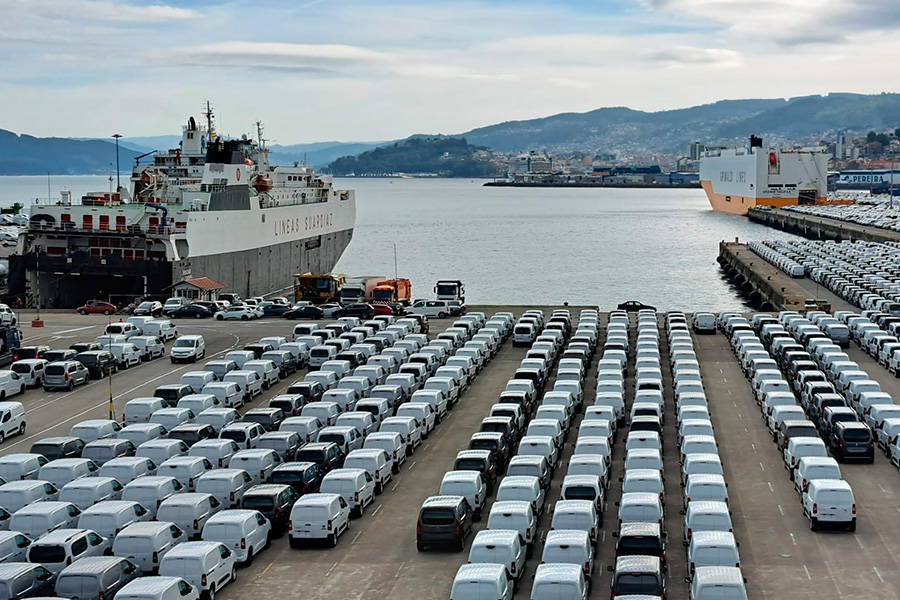Iberdrola España will implement a new technology for the decarbonisation of the Port of Vigo
-
It is called Onshore Power Supply (OPS) and will allow the electrical demands of ships at berth in port to be supplied with renewable energy and thus reduce their levels of atmospheric and noise pollution.
The shipping companies UECC and Suardiaz will be the first companies to benefit from the new electricity supply point, which is expected to be up and running in 2025 at the Ro-Ro Terminal in Bouzas.
The initiative has the support of the Ministry of Transport, Mobility and Urban Agenda (MITMA) – as it has been selected in the Programme of Support for Sustainable and Digital Transport in competitive concurrence, within the framework of the Recovery, Transformation and Resilience Plan – financed by the European Union – NextGenerationEU.

The International Maritime Organisation (IMO) has set a target to reduce emissions in maritime transport as soon as possible and reach net zero emissions by 2050.
For its part, in 2021 the European Commission published the Fit for 55 package, a set of proposals which, among other measures linked to maritime transport, promotes the use of electricity in port as one of the mechanisms for achieving the decarbonisation Enlace externo, se abre en ventana nueva. objectives of the member countries of the European Union.
Enlace externo, se abre en ventana nueva. objectives of the member countries of the European Union.
In this context, the Port of Vigo, together with Iberdrola España, will implement an innovative OPS (Onshore Power Supply) infrastructure to supply the electrical demands of moored ships with renewable energy and thus reduce their levels of atmospheric and noise pollution.
The initiative launched by Iberdrola España is supported by the Ministry of Transport, Mobility and Urban Agenda (MITMA) through the Sustainable and Digital Transport Support Programme within the framework of the Recovery, Transformation and Resilience Plan, financed by the European Union's Next Generation funds. The project presented by Iberdrola España "Deployment of Onshore Power Supply (OPS) technology and decarbonisation of the electricity supply in the ports of Pasaia, Vigo and Alicante" was selected by MITMA to receive a grant of €1.9 million.
The system allows ships to be connected to the shore power grid during their stay in port, so that the auxiliary engines used for their auxiliary systems (transfer pumps, refrigeration systems, lighting, emergency equipment, etc.) can be kept off during the entire time the ship is docked for loading and unloading of goods or people.
Eliminate emissions
Specifically, the electricity company will develop an energy system at the Port of Vigo's Car Terminal to provide service to Ro-Ro vessels loaded with vehicles – one of the port's main types of traffic. The installation of an OPS, or cold ironing, charging point will locally eliminate greenhouse gas emissions and improve air quality in the Port environment.
In this context, the president of the Port Authority of Vigo, Carlos Botana, highlighted the high interest of shipping companies in having this infrastructure, which will reduce their carbon footprint, "making Bouzas the first Ro-Ro Terminal in Spain to have this system, eliminating emissions from ships and noise in the Terminal, which will mean taking another step forward in the Blue Growth strategy that has been leading since 2016".
Botana also recalled that the institution over which he presides is currently working on other lines of investment to electrify its quay, specifically the Container and Cruise Terminal. In total, it is expected to allocate €25.6 million for various projects.
According to estimates by the International Maritime Organisation (IMO), the use of these emerging technologies can reduce the noise impact produced by ships during loading and unloading operations by up to 16 decibels – thus improving the quality of life of residents in the vicinity of the port.
In short, the advantages of this system include savings compared to traditional fuels: a reduction in local emissions emitted into the atmosphere, a reduction in vibrations and noise produced during docking, and less wear and tear on auxiliary engines. Furthermore, the decarbonisation of the energy supply will be greater as Iberdrola España will supply the ships with photovoltaic energy Enlace externo, se abre en ventana nueva. generated in situ.
Enlace externo, se abre en ventana nueva. generated in situ.
Coverage of the rest of the port environment
"Likewise, when the ships adapted to the electrified system are not docked, or there are additional surpluses, the surplus photovoltaic energy will be used to cover other operators and customers in the port environment, supplying green energy, and exploring collective self-consumption modalities, in which the electricity company assumes the initial investment", explains Borja Cancela, Iberdrola España's commercial delegate for Galicia and Asturias.
Iberdrola España's Vigo port ecosystem electrification project starts after the awarding of the administrative concession and is expected to be up and running in 2025.
The OPS station will be equipped with a ship connection kit, a mobile crane solution mounted on an electric vehicle, which will allow the cable to be connected to the ship quickly and safely.
According to calculations made by Puertos del Estado, the local elimination of emissions achieved after replacing on-board electricity generation – produced by burning fuel, with the ship's own connection to the grid – means a drastic reduction in emissions at State level compared to generation using marine fuel, given the current mix of the Spanish electricity system: 96% of NOx, 8% of SOx, 94% of particulates and 64% of CO2. The reduction is greater in the case of supplying renewable energies, as will be the case in Vigo.